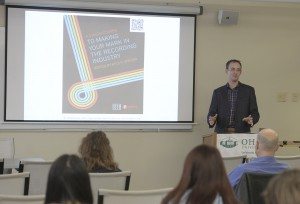The world of publishing is constantly changing, and in response to that change, OHIO Libraries is hosting a panel discussion on the benefits and challenges of open publishing.
Four OHIO faculty from the departments of math, political science, media arts and studies, and geological sciences will speak at the “Open in action: the practicalities and pitfalls” panel presentation, which will be held on Oct. 26 at 1 p.m. in Alden 319. The panel will give researchers and faculty the opportunity to hear from their colleagues who have successfully published open access resources and learn more about the value of open publishing.
The open access movement promotes access to academic research by freely disseminating ideas and information, often online.

“Under the current publication system, sometimes institutions can’t even afford to subscribe to the commercial journals in which their own researchers are published,” said Andrew Stuart, assistant head of reference.
Kelly Broughton, assistant dean for research and education services, said the world of publishing is quickly changing, and open access resources are a response to that change.
“Open access has the potential to change our broken scholarly publishing model—to remove the pay walls from the results of research funded by taxpayers and tuition,” Broughton said. “The only way to really accomplish this is for faculty to be open to new modes of scholarly communication and to test the impact of these modes.”
Jennifer Fredette, assistant professor of political science, will be speaking at the panel about her open licensed publication “Constructing Muslims in France: Discourse, Public Identity and the Politics of Citizenship,” which was published through the Temple University Press in 2014. The book is available for free online with a Creative Commons license through Knowledge Unlatched, an organization that works with libraries and publishers to make research more freely available.
“For me, as a scholar, open access is key for knowledge dissemination,” Fredette said. “It’s amazingly useful for me to be able to tell students, colleagues, and people I meet at conferences, ‘Oh yeah, you might want to read my book. It’s free; just Google my name.’ That’s an incredible resource.”
Martin Mohlenkamp, an associate professor of mathematics and another speaker on the panel, has both taught with open resources and co-authored an open access textbook. He has incorporated open resources into his teaching by having his students improve Wikipedia articles on math concepts as class assignments, and he uses the SageMath cloud computing environment in some of his courses. This software allows his students to collaborate with each other on the same programs, even if they are using different computers.
His book “Introduction to Numerical Methods and Matlab Programming for Engineers,” available free online, is used in the MATH 3600 Applied Numerical Methods course. He co-authored the book with Todd Young, who created the Math 3600 course and was able to customize the text for that class. One piece of advice that Mohlenkamp has for researchers who want to look into open publishing is “scratch your own itches.”
“Do something that you’re going to get value out of and you’re going to use so that your own dissatisfaction is fixed,” he said.
Daniel Hembree, associate professor of geological sciences and another panel speaker, serves as a handling editor for Palaeontologica Electronica, an open access journal. He said the journal’s online presence gives researchers the opportunity to include digital features such as animation in their articles, and the journal can also easily publish in full color. Having the journal online has also helped the content reach an international audience.
“There are no publishing costs associated with it. It’s a nice venue for getting research out and making it available globally,” Hembree said.
Kyle P. Snyder, a lecturer in media arts and studies and another panelist, authored the open access book “A Crash Course to Making Your Mark in the Recording Industry.” The publishers, Routledge and Focal Press, partnered with Creative Live to make the book open access, although readers have to provide an email address to download a copy. Snyder not only contributed his own writing but also reached out to other researchers in the field to contribute.
“My goal was to take what I thought was the best information that they had and make it free to audio engineers. If I wrote a basic book right now, what would I want my students to have access to?” he said.
Snyder is also chair of the education committee for the Audio Engineering Society, a professional society devoted to audio technology, and has worked with open publishing in that role.
The Libraries is holding the panel to celebrate Open Access Week, which will be held by SPARC Oct. 24-30 to encourage publishers and universities to increase access to open resources.
The panel is only one of many of the Libraries’ initiatives to increase awareness of open resources, such as the Alt-Textbook initiative, which helped students save money by encouraging faculty to use open access and Library resources rather than textbooks.
Leave a Reply